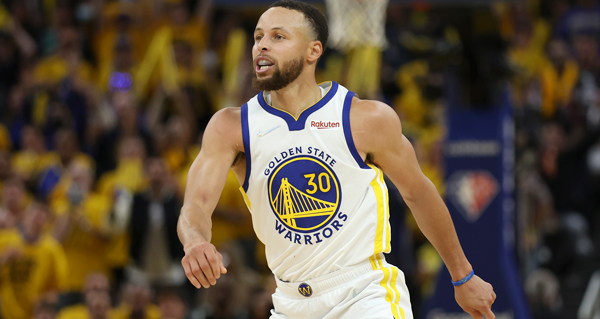Stephen Curry has been named to the All-NBA Second Team lineup of five. This was far from his best season, statistically, despite being the campaign in which he very ceremoniously set the record for the most three-pointers ever made in a basketball career, surpassing then-leader Ray Allen—at Madison Square Garden, no less. Aside from that exciting moment, though, it's been a ho-hum year from the two-time MVP, with his own accomplishments mixing humbly in with those of his team. He missed 18 games from injury and shot the worst percentage from deep in his life, but his Golden State Warriors won 53 games, their most in three seasons. And now, they're on the brink of a sixth appearance in the NBA Finals.
Draymond Green, one of the few Warriors to join Curry for each of those missions, had a missable 2021-22 himself. At 46 games played, he barely got through half the season on the floor, with his at-first compelling surge toward a second Defensive Player of The Year trophy taking a sideline to the long-term goal of playing in June. Klay Thompson, Curry's other chief mainstay, returned from a two-year absence in the winter, and was load-managed to the tune of just 32 games played as he shook off the rust, which he is still doing as he fits into the bigger Golden State picture less dazzlingly then he once did. Andre Iguodala, mostly just here for one last championship ride, played even less and is 38 years old, verging quite visibly on not even being a pro player anymore.
These four, put together with Steve Kerr, make up an increasingly diminishing share of the minutes, the labor, and the production that the Warriors need on the court 82 games every season. They have gotten the franchise back on its dynastic track, nonetheless, because collectively they've got something grander than what takes place discretely between the hardwood lines, or within any 48 minutes, however competitive they may be: a premise. A matrix, a way of being; a way of seeing and believing, that can be imparted upon others. Just ask Jordan Poole, Kevon Looney, and Andrew Wiggins, for starters. Ask Jonathan Kuminga, Moses Moody, Gary Payton II, Otto Porter Jr., or Nemanja Bjelica.
Cast-offs, disappointments, or hyper-green youngsters all, the Neo-Warriors have bought into the church of basketball erected by their peers who are also their forebears. Poole was a late first-round pick, who has become Curry's padawan and snuck into form as a devastatingly fluid and confident combo guard; Looney is a stolid and undersized center with absolutely no flash in his game, but he has internalized a poetics of basketball space to gutty effect; Wiggins, once considered a bust as a super-hyped No. 1 overall draft pick referred to as the Canadian version of Michael Jordan, has discovered an unlikely mid-season stride as exactly the athletic, hard-working wingman that a title team needs—currently, he is minimizing Luka Doncic's options as the Warriors lead the Dallas Mavericks 3-1 in the Western Conference Finals, and need just one more victory to return to the championship round for the first time since 2019.
What, exactly, is it that has snapped these guys so fittingly into place? What has made Bjelica's passing come alive more than ever, and Kuminga's swiftness on the roll and power at the rim so scary for the future of the league? Why does Moody's surprise postseason emergence seem so unfair, just like Porter's minimum veteran deal, now looking like one of the biggest steals in the sport? Why is Payton's development into an All-Defensive type of talent also here so frustrating for the competition? The individual achievements described should not be diminished for what they are on their own, but the reason they collect into a boulder capable of knocking all else over is because the Warriors have what other teams do not, to house all these wonders: a concept. An idea, a philosophy, an ethos.
Like that of the San Antonio Spurs before them, it is a flexible rasion d'être. It has to do with selflessness, sure, and also intelligence. More than ever, it has to do with physical toughness, as Golden State now offers a brute force that it did not before, with Curry most notably trading some of his sharpshooting and finesse for more muscle, fitness, and resilience. The Warriors thesis has always had to do with mental toughness, though. They have always been able to look into the opponent's eye in a way that cannot be countered, and convince them and everyone watching that the avalanche is near, that there is a frenzy coming that they could understand and control, and that you would not be nearly literate enough to navigate. The ball will move faster, ping more dynamically than anyone's body can, and they will be the bumpers through which it flows—not you. This, more than anything that any one man can provide, is what is so frightening about this team.
Aside from Steph, who no longer wows like he used to but is instead now in the rugged latter phase of his endurant Hero's Journey arc, the Warriors are no longer a team of superstars. Thompson and Green still have that kind of fame, but they have lost much of their power on court, and are scarier as executors of the Warriors' mindset—authored by this trio, by Iguodala, and by Kerr. The zygote of it has been implanted in the rest of them, too, now, and looks ready to take form for longer enough to stretch this indelible run, slumbering through two seasons but now very much in motion again, to a rather impressive decade-long mark. On the edge of their return to the Finals, the Warriors may not win the 2022 Larry O'Brien trophy, but it's clear that they'll stay near its glow for years to come.



